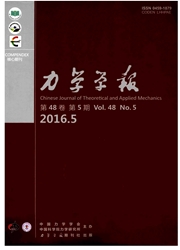

 中文摘要:
中文摘要:
最小二乘跟踪方法是近几年提出的一种计算动力系统跟踪轨迹的方法.基于最小二乘跟踪的灵敏度分析算法可以有效避免传统的非线性系统灵敏度分析方法中的病态初值问题,因此其在混沌系统灵敏度分析方面有着重要的应用.针对非线性的最小二乘跟踪问题,首先将其重新描述为带有约束的非线性最优控制问题,引入协态变量并将系统的哈密顿函数表示为关于状态变量和协态变量的函数.然后将目标函数的积分时间离散化,根据对偶变量变分原理,以离散区间两端的状态变量作为独立变量,用Lagrange插值多项式近似离散区间内的状态变量和协态变量,进而将非线性最优控制问题转化为求解非线性方程组问题.这种算法无需对原问题做线性化处理,避免了复杂的线性化过程以及可能因此造成的误差,同时为求解非线性最小二乘跟踪问题提供了新的思路.根据最小二乘方法可以得到两条设计参数有微小变化的状态轨迹,基于这两条状态轨迹可进一步计算出系统关于设计参数的灵敏度,范德波振子作为数值算例验证了该方法在求解最小二乘跟踪问题以及计算非线性系统灵敏度时的有效性.
 英文摘要:
英文摘要:
The least squares shadowing(LSS) method, to compute the shadowing trajectories of dynamical systems, has been presented in recent years. The ill-posed initial value problem within the conventional sensitivity analysis algorithm for nonlinear systems can be effectively avoided based on the LSS method, which therefore has significant applications in the sensitivity analysis of chaotic systems. To achieve nonlinear LSS problem, it will be firstly represented as a nonlinear optimal control problem subject to constraints. By introducing the costate variables, the Hamiltonian function is represented depending on state and costate variables. The integral time of objective function is then discretized, and the state variables at ends of time interval are taken as independent variables. Then approximate the state and costate variables in the time interval using the Lagrange polynomials. This problem is finally transformed into solving nonlinear equations via dual variable variation principle. The linearizing process is avoided for the proposed algorithm, and then the errors,caused by the complex linearizing process, are also reduced, which provides a new solution for solving the shadowing problem. Two state trajectories with designing parameters slightly changed can be obtained by LSS problem, and then the sensitivity of the nonlinear system is calculated from the two trajectories. Van der Pol oscillator as a numerical example shows that this method is effective for the LSS problem and sensitivity analysis of nonlinear systems.
 同期刊论文项目
同期刊论文项目
 同项目期刊论文
同项目期刊论文
 期刊信息
期刊信息
